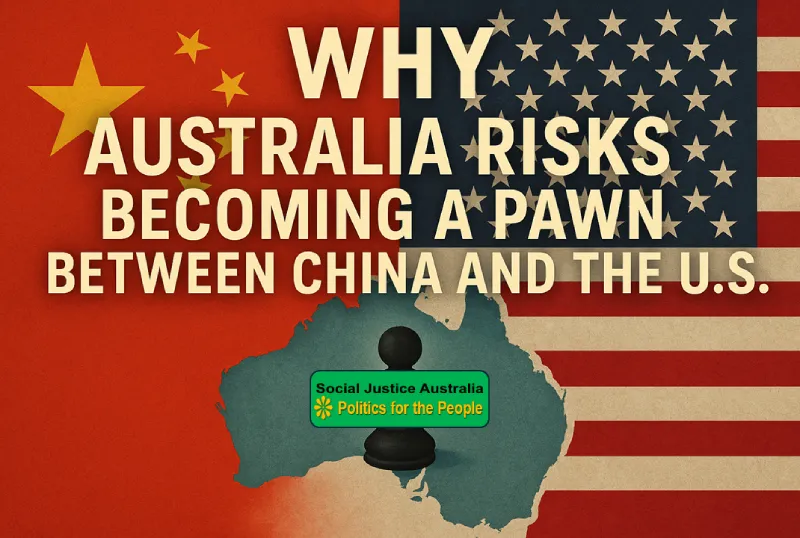Description
Australia risks becoming a pawn between China and the U.S. We must choose obedience to the empire or true sovereignty. Here’s what’s at stake.
China, the U.S., and Us: Australia at the Crossroads of Empire
Introduction
Location: Darwin, Northern Territory.
In the early morning haze, U.S. Marines march in formation across a dusty base just outside Darwin. Residents sip their coffee, pretending it doesn’t feel foreign to see another nation’s troops training on Australian soil.
Australia stands uneasily between two superpowers: China, our largest trading partner, and the United States, our closest military ally. With tensions escalating in the Indo-Pacific, many Australians ask: Who are we truly allied with? And at what cost?
This article explores the precarious balance Australia tries to maintain between economic prosperity and military loyalty. It uncovers the risks of becoming a pawn in a proxy battleground in a superpower standoff and proposes a path toward real sovereignty through neutrality, diplomacy, and peace.
The Problem: Australia’s Alliance Trap
The ANZUS Treaty and Our Security Addiction
In 1951, the ANZUS Treaty formalised Australia’s security alliance with the U.S. It promised cooperation but never a guarantee of defence. Still, the alliance grew. U.S. bases appeared. Our foreign policy bent further westward. We followed America into Vietnam, Iraq, and Afghanistan.
“We’re not just mates; we fight together,” said John Howard in 2003, when he joined Bush in the invasion of Iraq.
Australia’s alignment became habitual, justified by perceived protection from an Asian threat. But does loyalty mean relinquishing our judgment and risking becoming a pawn?
The Quiet Expansion of U.S. Military Presence
Today, thousands of U.S. troops rotate through Darwin. Pine Gap, the U.S.-controlled surveillance base near Alice Springs, is central to American military operations in Asia. Our soil is now part of America’s war machine.
Former PM Paul Keating warned, “AUKUS is about the U.S. positioning us as a base for its confrontation with China.”
We host these facilities without public debate, forfeiting sovereignty for alliance.
Caught in the Middle of a Superpower Showdown
Our Trade Dependency on China
China buys over a third of Australia’s exports. From iron ore and coal to wine and lobsters, our prosperity relies on Chinese demand. After Australia called for an inquiry into COVID-19’s origins, Beijing imposed trade sanctions. Industries collapsed almost overnight.
Internal thought: “I lost $1 million worth of wine exports,” one South Australian vintner told ABC. “Not because of the product, but because of politics.”
Provoking the Hand That Feeds
While China is painted as a threat, Australia increasingly adopts U.S. military language, joining exercises like Talisman Sabre that simulate conflict with China. This creates a dangerous cycle of provocation.
Emotional reflection: The average Australian wonders, “Why are we poking the dragon while living in its den?”
Reclaiming Sovereignty Through Peace
Rethinking Foreign Policy: The Neutrality Option
Neutral countries like Switzerland, Finland (before NATO), and Costa Rica show that peace and prosperity can coexist. Australia could pursue a diplomacy-first policy, strengthen regional ties (ASEAN, Pacific Islands), and become a peace broker in the Indo-Pacific.
Ending the Myth: U.S. Protection is Not Free
Hosting foreign troops and following U.S. strategy risks war on home soil. We must ask:
• What is the real cost of obedience?
• Do we want to be a target in a war we didn’t start?
Dialogue: “Our children could be conscripted not for Australia, but for American interests,” warns Senator David Shoebridge.
Australia’s Dollar Sovereignty: Funding Peace, Avoiding Australia Risks Becoming a Pawn
Australia’s government issues its own currency. It doesn’t need to raise taxes or borrow from others to fund peace-focused initiatives. We can:
• Fund local diplomacy programs
• Invest in regional aid
• Build an independent defence force
• Promote conflict resolution education
All without selling ourselves to military-industrial interests.
Summary: The Fork in the Road

Australia stands at a historic turning point. We can continue down the path of subservience, playing proxy in a U.S.-China conflict, and Australia risking becoming a pawn. Or we can choose a path of neutrality, independence, and peace.
With our economic future tied to China and our military tied to the U.S., we must ask: Who benefits from this tension? Indeed, not the Australian public.
It’s time to regain control of our foreign policy instead of risking becoming a pawn.
Q&A Section
Q: Can Australia truly stay neutral in a global conflict?
A: Yes, but it requires political courage and a shift in priorities. Neutrality is a choice backed by diplomatic strength and public will.
Q: Isn’t hosting U.S. bases a strategic necessity?
A: Not necessarily. Proper defence doesn’t mean dependence. Independent military capacity combined with intense regional diplomacy is more sustainable.
Q: How does dollar sovereignty support a peace-first policy?
A: A monetarily sovereign government like Australia’s can issue currency to fund peace building, humanitarian aid, and diplomacy without relying on cuts or external borrowing.
Q: Why does allowing U.S. bases on Australian soil make us a pawn?
A: When Australian politicians approve U.S. military bases without public consultation, they effectively surrender a degree of sovereignty. These bases serve U.S. strategic goals, not necessarily Australia’s. In the event of a U.S.-China conflict, Australia becomes a launching pad and target, entangled in a war not of its own making. This compromises our ability to act independently and diplomatically on the world stage.
Question for Readers
Have you felt conflicted about Australia’s position between China and the U.S. and the risks of becoming a pawn? How do you think our nation can reclaim its independence?
Call to Action
If you found this article insightful, explore more about political reform and Australia’s monetary sovereignty at Social Justice Australia.
Click on our “Reader Feedback” menu. Please let us know how our content has inspired you. Submit your testimonial and help shape the conversation today!
Additionally, leave a comment about this article below.
Support Social Justice Australia – Help Keep This Platform Running
Social Justice Australia is committed to delivering independent, in-depth analysis of the critical issues affecting Australians. Unlike corporate-backed media, we rely on you.
💰 A one-time or monthly donation ensures Social Justice Australia stays independent.
🔗 Donate Now
Thank you for being part of this movement for change. Your support is truly appreciated!

